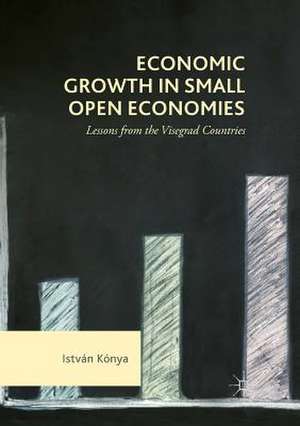Economic Growth in Small Open Economies: Lessons from the Visegrad Countries
Autor István Kónyaen Limba Engleză Paperback – 4 iun 2019
| Toate formatele și edițiile | Preț | Express |
|---|---|---|
| Paperback (1) | 716.42 lei 6-8 săpt. | |
| Springer International Publishing – 4 iun 2019 | 716.42 lei 6-8 săpt. | |
| Hardback (1) | 724.95 lei 6-8 săpt. | |
| Springer International Publishing – feb 2018 | 724.95 lei 6-8 săpt. |
Preț: 716.42 lei
Preț vechi: 873.67 lei
-18% Nou
Puncte Express: 1075
Preț estimativ în valută:
137.11€ • 141.45$ • 116.04£
137.11€ • 141.45$ • 116.04£
Carte tipărită la comandă
Livrare economică 04-18 martie
Preluare comenzi: 021 569.72.76
Specificații
ISBN-13: 9783319887548
ISBN-10: 3319887548
Pagini: 209
Ilustrații: XVII, 209 p. 51 illus. in color.
Dimensiuni: 148 x 210 mm
Greutate: 0.28 kg
Ediția:Softcover reprint of the original 1st ed. 2018
Editura: Springer International Publishing
Colecția Palgrave Macmillan
Locul publicării:Cham, Switzerland
ISBN-10: 3319887548
Pagini: 209
Ilustrații: XVII, 209 p. 51 illus. in color.
Dimensiuni: 148 x 210 mm
Greutate: 0.28 kg
Ediția:Softcover reprint of the original 1st ed. 2018
Editura: Springer International Publishing
Colecția Palgrave Macmillan
Locul publicării:Cham, Switzerland
Cuprins
1. Introduction.- 2.Methodology and stylised facts.- 3. Labour input and labour income.- 4. Capital stock and capacity utilisation.- 5. Growth and development accounting.- 6. The neoclassical growth model.- 7. Markets and distortions.- 8. Growth and the financial environment.- 9. Credit crisis and growth.
Notă biografică
István Kónya is Visiting Professor at the Economics Department of the Central European University in Budapest, Hungary, and Research Advisor at the Institute of Economics of the Hungarian Academy of Sciences. Previously, he worked as an assistant professor at Boston College, USA (2001-2004).
His research interests are in economic growth, labor economics and international economics.
István received his Ph.D. from Northwestern University in 2001. He also holds an M.A. in Economics from the Budapest University of Economics Sciences (1996). He currently teaches Macroeconomic Theory (MA) and Growth and Development (PhD).
Caracteristici
Deals with a topic not consistently covered before: the growth process after economic transition from centrally planned to market economies Introduces new ideas in explaining growth shocks Presents a clear and structured model that can be applied to different countries, making comparisons easier
